
After being in a toxic relationship we lose our sense of individuality.
We become conditioned to ignore our wants, needs, values, likes, and dislikes. Self-expression was threatening to the toxic person so it was squashed in subtle ways. We learned that individuality returned negative consequences in some form or another. In order to heal from toxic relationships we must regain our sense of self and honor our uniqueness. Relearn that it is okay to be different, and not have the same opinions, interests, or needs as others. In fact, not only is it okay, it is vital to the human race that we are all different.

Find your passion. Let your music be heard.
“Be daring, be different, be impractical, be anything that will assert integrity of purpose and imaginative vision against the play-it-safers, the creatures of the commonplace, the slaves of the ordinary.“
~ Cecil Beaton
To fully heal from toxic pain, you have to remember who you are.
For years I did not honor my own individuality. I tried desperately to hide any differences so that I might fit in, often at the expense of my own uniqueness, talents, interests, beliefs and behaviors. I hid a lot of what makes me me because I feared appearing different and ultimately being punished or rejected. One of the biggest milestones in healing from toxic relationships is when we can recognize that our individuality is valuable.
Think of our education system. Schools are primarily about conforming so that teachers and staff can keep order. Students are taught very early to walk a straight line, when to speak and when to keep quiet, what types of things they are aloud to say, ask, do, and even think. Awards are given to every child so that nobody feels left out or bad about themselves, even if Jack runs faster than Anthony, they both get an award. And when Anthony is better at reading, they still both get awards. How does this honor each of their unique talents and celebrate their individuality? It only reinforces the false concept that we must all be alike, which squashes not only uniqueness but also self-esteem, because no two people are alike.
Being like everyone else is an impossibility, a guaranteed failure, an expectation that nobody can fulfill. In our education system, churches, and other institutions, individual thinking is frowned upon. Imagine how the world would be if people like Leonardo Da Vinci, Darwin, Thomas Edison, or Albert Einstein thought only as they were instructed to think? Anyone who ever stood out from the rest and achieved greatness, only did so because of their uniqueness. They may have fought many battles for it, but today are considered great visionaries, and world changers.
How do you stand out?
Healing from toxic relationships requires asserting your individuality.
It took a long time and a lot of courage to reveal certain aspects of myself such as my own quirkiness, talents, interests or fascinations that others seemed to find dull (which of course, would mean that I must therefore be dull). I’m still working on this, and even writing this blog feels scary. I have to keep reminding myself that the more genuine I am about who I am, the more I find like-minded people. After unknowingly being controlled by others for so many years, characteristics like courage, trust and internal fortitude are only a few of the things that took a toll. The risk of losing perceived friends or connections with others seemed too overwhelming to allow my true self to show. Exposing feelings, interests, beliefs, etc. hadn’t worked out for me during my relationships with controlling people because controlling people are threatened by these qualities as they represent self-confidence, strength and independence. Controllers will use whatever methods they can to break those characteristics down in order to gain control.
How can we possibly see the big picture from the single perspective of our comparatively tiny human brains? There are about 6 billion humans on this planet. It fascinates me that out of the billions and trillions of humans that have ever lived, each one of us is unique. Sure, there are similarities, but none of us are exactly the same. Did you ever contemplate the magnitude of this? Why, and how are we all so different? Imagine what life would be like if we were all the same. Let’s take a quick microscopic look at any living thing. Each cell has a valuable and vital function to fill. A flower has many parts just to bloom into a flower so that it can carry out its own purpose in life. A seed begins with a cell, which divides, and as the cells increase in number they begin to have different characteristics to carry out specific roles; root, stem, leaf, bud, bloom, petal, pollen and or fruit and so on. They all work together for a greater purpose but they each have their own specific function. Our bodies are similar, with each cell instructed to perform specific tasks. Each cell is valuable in its uniqueness, just as each individual human is a valuable and vital asset to something much greater than ourselves. Our value and purpose usually expands much beyond comprehension.
Self-confidence is usually the first thing to be attacked in a toxic relationship.
Healing from toxic relationships requires a rebuilding of self-confidence. Whether through overt or covert tactics manipulators target your sense of self. Without self-confidence there will be little to support independent thinking or strength of character. Where did that self-confidence go? Don’t worry, it’s still there, it’s just buried under a lot of fear, obligation and guilt (FOG). The first thing we need to do is start questioning everything. Our beliefs may have been adopted automatically through exposure to the doctrines around us like our parents, spouses, churches, education, friends, or other trainings. A controlling relationship will certainly speed up the process of unconsciously changing our beliefs. We may not even notice the beliefs we gradually adopt through subtle training, manipulation and scare tactics. Any emotion paired with fear is supercharged and on high alert, ready for action, even if that means conformation to external influences. Controllers attempt to impose their set of rules onto others in their attempt to gain their own personal wants, needs, and desires. If they can program their partner, child, or employee to do their bidding, that makes their life so much easier.
So how do we begin to tap into courage and strength?
Finding our way back to the that stuff that sets us apart and makes us awesome is the exciting part of the journey to healing. There are some exercises that can help boost your sense of self and thereby increase self-confidence, the driving force behind regaining your sense of self. All of them work toward healing and increasing awareness about who you are and who you are meant to be on this planet as a unique individual with a distinct purpose that nobody else can quite fulfill.
1. Stop worrying about pleasing others.
Put yourself first, meaning your needs, your feelings, your wants, your desires and your sanity. Being in a controlling relationship literally trains you to put others first. Over time you forget about your own needs because you are hyper-focused on pleasing others. This happens because you are either rewarded or punished for putting others first. You begin to operate from a place of fear rather than from a place of love. You might fear the consequences of another’s displeasure, anger or bad mood. If you pay attention to your reactions, you will notice that you live in fear of their anger or hurt feelings. What is controlling you? Ask yourself what it is that you are worried about? Why do you care what others think or feel, especially at the cost of your own joy. Giving away your joy is a surefire way to decrease self-esteem, so stop. Be nice to yourself and quit worrying about others’ anger, feelings, opinions or even attention. Give your attention to the things that you actually enjoy.
2. Pay attention to your sensory experiences.
How will we know what we actually enjoy if we don’t pay attention to the way we experience the world around us? That is the soul purpose of our bodies, to experience life. We have five measurable ways to do this; through sight, sound, taste, touch and smell. We each experience the world in our own ways but can only make measurable interpretations through these five senses. There are other senses that give us information about our world such as balance, intuition, our sense of love and energy, even though we have yet to accurately form a system to measure these things. Pay attention to all of your senses and dive into the human experience of the moment, indulge in a sensory bath and really notice what and how you feel. Notice what you enjoy and what inspires you. This not only allows you to be you through the practice of seeing the world through your own eyes, so to speak, but is also very grounding. It places you in the moment instead of the constant state of worry about the past or future. This exercise allows your to experience new things and form new sensory associations, which helps compete against the strong sensory associations created by the false input of others.
3. Go outside of your comfort zone every once in a while.

Another way to boost self-confidence and heal from toxic relationships is to go outside of your comfort zone. It might seem daunting at first, but with a little effort it can do wonders for your self-esteem. Take baby steps with this one. You might start by tasting something that you have been too afraid to try. Next, maybe reach out and send that email, make that phone call or join that meet-up group and start making connections. Each time you push yourself a little more, you gain a sense of accomplishment and the fear that holds you hostage begins to diminish. That fear of yours keeps you stuck not just within your comfort zone of familiarity, but at the mercy of the other person. Think about it, your controller wants you fearful. This ensures that you will not be venturing out on your own and out from under their control. This also provides them the added bonus of not having to keep an eye on you or barricade you in anyway, while giving you the misconception that staying put is your own choice and no fault of theirs. How convenient is this for them? It will feel a little scary at first but, if you start pushing the boundaries of your own comfort zone, your limits will expand, your horizon will widen and your world will become richer, enhanced with meaningful experiences and adventures.
4. Rebuild your self-confidence and be proud of who you are.
The last thing toxic people want is for you to have self-confidence. The more you do, the more you can do and the more you learn to trust yourself. You gain a sense of accomplishment and pride each time you try something that aligns with your soul. Be proud of the essence of you and everything about you. You did not exactly design yourself so it is okay to be grateful for all the wonderful things you were given such as your unique interests, feelings, preferences, quirks,thoughts, voice, and every single unique thing about you, even your faults. Nobody can take these things from you. These are yours from birth and a life of experiences. Look in the mirror every day and remind yourself that you are just as important and unique as any other human on this planet. Why shouldn’t you be?
For a long time I kept hoping that I would do something great, affect the world in some grand way to justify my existence, otherwise, my brain kept telling myself, I’m nobody. Gradually I’m realizing that I don’t have to do something great, or even do anything to be worthy of self-compassion. I give compassion out freely without any conditions of grand achievements. Why not turn that around to myself? If you notice that you’re doing the same thing, give yourself the love and compassion that you give others. In fact, double that for yourself. Wrap your arms around that beautiful soul and give thanks for the air you breath, the sounds you hear, the sights you see, the tastes you taste and the smells that bring you pleasure and pain.
5. Know your value.
Toxic people violate boundaries. When our boundaries are broken, the lines between us and the outside world are blurred and we forget our individual purpose. We are each an important part of this life process or we would not be here. None of us can see from our own perspective our own worth. That is not even for us to determine. All you have to do is trust that you were designed the way you were, not by you but by something much greater than you, much greater than all of us, for reasons we cannot fathom. No matter how bad things may seem, or how many people may disagree with you, may not like you, or may reject you, you are here and by the laws of the universe and principles of nature. You are here with unique qualities that are essential to this world. Believe in yourself, in your heart and soul that you are actually and literally, a force of nature. You are living, breathing proof of life with the ability to effect change, influence and inspire. In fact there is no way for you to exist without effecting change. So every idea you receive is far reaching and contains unknown possibility. Focus on your sense of self and before you know it, the damage you experienced from toxic relationships will be healed. Share your awesomeness with the world. Please, for the rest of us, let your light shine brightly.



